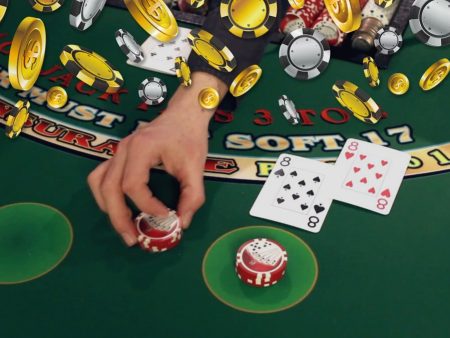Everyone is an expert blackjack when it comes to gambling.
How many secrets are there for us to discover?
While it’s good to revisit old advice, what is really important is to distinguish fact from fiction. These are facts that were buried by high expectations, if not fiction.
1. Blackjack’s House Edge is the lowest
The house advantage is the percentage of players bets that the casino expects to keep. However, it is not as fixed as we were told. This established fact can be misleading for many reasons. Here are two of the most common:
The majority of players make huge mistakes. All the blackjack advice you need is available. Although you can easily memorize the rules and when to play each card, it takes practice to master blackjack. You can’t do it if you drink alcohol for hours at a time in a casino. While we can all enjoy a good drink every now and again, alcohol impairs our judgment. The casinos know this.
It is difficult for novice players to remember the basics of the game. Experimented players may get distracted if they don’t play often enough. Blackjack is a social game. Some people like to flirt with the dealers. No matter the reason, you’ll make mistakes if your mind wanders from the game.
This is evident from the monthly casino revenue reports that are filed with government agencies. Some casinos retain as high as 15% to 20% of the player blackjack bets. This is a very high house edge for a game that has a 1% chance of winning!
Casinos Have Different Rules. Blackjack is not a single game. The casinos will only accept strategies that are compatible with the basics of blackjack. Experts recommend that you pay attention to the rules of the table. These rules are displayed on a sign at the table or are engraved on the felt top of the table.
You can bring your basic blackjack skills to Spanish 21 and get a chance at giving the casino money. There may be ten blackjack tables, but that does not mean they all play by the same rules. This is something that experienced players are well aware of. It is possible for naive players to not understand that they must learn every variation of the game.
As always, you should not play 6:5 blackjack if there are 3 or 2 tables. Don’t even try to play a 6/5 game.
2. The Probabilities only Change when you have the cards
Although no one actually says it, most articles on blackjack probabilities suggest it. The probabilities change as the deck is shuffled and the card mix changes.
Most advice articles state that if you have a lot high-value cards in your shuffle, your chances of getting another face card decrease with each round. This is true. However, these probabilities can also be affected by how many people are present or absent from your table.
Let’s suppose you have 8 decks of cards in your shoe. It is possible to expect 128 face cards, 10s and 416 cards to be distributed. You have a nearly equal chance of getting the high-value cards if you are alone. Because the dealer waits for your win, bust or stand before he plays his hand, he has a slight advantage.
However, if another player joins your table, your chances of drawing high-value cards are about one third lower. Your chances of drawing a high-value card drop by 25% when you add another player to the table. As other players grab them, those 128 high-value cards will become very rare.
This doesn’t mean that you should only play against the dealer. It works the same way with low-value cards as with high-value cards. You are less likely to draw a pair with three other players. You can better understand how the game works by estimating probabilities. While this is a great thing, it doesn’t mean that you can know everything.
3. It doesn’t matter how the cards are shuffled
This is a huge issue and doesn’t seem to get enough attention.
Have you ever played at a table with a Continuous Shaffle Machine
This will ruin all your calculations. CSMs can be used to discourage or hinder card counting. Card counting can give players an advantage if they use it correctly. Casinos won’t allow card-counters to play their games. Your card counting advantage is destroyed by the CSM.
Even if your team is not a professional card counter, you can reduce the chance of the game being influenced by random factors by avoiding tables that use Continuous Shuffle Machines. You can tell the casino what games you like by giving them your money. Manual shuffling should also be considered when choosing a table.
Continuous Shuffle Machines enable the dealer to turn more rounds per an hour. The casino makes more money if it plays more rounds. You will spend more money if you’re just looking to have fun, as the dealer will still shuffle the cards. You can walk away with a winner better if you are a skilled player. You can expect to lose a small amount at a table that has CSM-assisted trading.
Also Read: Where Should You Play Blackjack in Las Vegas?
4. All dealers play the same game
For good reason, casinos keep an eye on their dealers. Sometimes a dealer makes a mistake. Sometimes, a dealer makes a mistake. Both types of dealer are bad for casinos. While it is true that dealers are kept on a tight leash by casinos, they do not always play the same games.
A crooked dealer is not someone you want to play with. It’s illegal. If he doesn’t work with you, he won’t help you anyway.
You want to find an honest dealer but who is still learning . Most casinos have at most one new dealer each month. You’ll see more people if you play often. Dealers sometimes change jobs and bring their experiences with them. They won’t be much of any help to you.
A dealer who is still learning the trade is more likely than a player who is a pro at it to make mistakes that will benefit savvy players. This is an opportunistic strategy and not something you can rely on every time you go to a casino. Keep in mind that not all dealers play the same game.
Some dealers are just too good. They may be popular among tourists unfamiliar with the game. Although they may not be technically wrong, these dealers win more often that you might expect based on basic probabilities. Take a look at the tables and observe how lucky the dealers are. If the dealer’s luck seems too good to be true, and players aren’t willing to leave, move on.
5. Ask the dealer for assistance
This is what every new player does. If you are unsure, ask the dealer for help. Every casino has its own rules for how dealers should interact with players. Players often assume that the dealer is able to play the game the same way as a player. Dealers have different rules than players.
The dealer will be able to explain the rules of the table to you. The dealer should be able to explain all the rules. Ask the dealer for the rules.
Don’t ask the dealer for advice on strategy and deciding what to do. Although the dealer might have the best intentions, the casino may not be interested in your advice. All of this is being recorded and all transactions are being monitored. It is difficult for dealers to cheat.
The dealer might be terrible at blackjack, even though they may not know it. Don’t assume that the dealer knows basic blackjack strategy if you don’t. Flip a coin if you need assistance. You have about 50% chance of making a mistake. This is the average rate for those who are new to the game.
Remember that the dealer is not your friend. The dealer is not there to entertain you. Your needs come last.
Conclusion
Although you can find lots of great advice online, the waters get rough when reality meets advice. It’s like cold air splashing into warm and moist air. It’s hard to know what to expect. For many valid reasons, good advice can be incorrect.
You can only get the best advice from anyone: Have fun with it, keep your budget within reach, and have some guidelines about when you should walk away, even if you win. That should not be a problem.
What are some strategic decisions players should make in blackjack?
If you’re looking for an exciting game to play and the chance to maximize your chances of winning, blackjack offers one of the best options. Not only is it a popular game, it is also relatively straightforward and more of a game of luck than skill, which means everyone can learn to play. Despite its relative simplicity, there are a few blackjack secrets that you should know as you get to grips with the game to increase your chances of winning.Secret #1 – Try Not to Bust
When playing blackjack, this tip may sound obvious, but it’s extremely important. The goal is to get closer to or as close to 21 as possible, while also beating the dealer. If you go bust – that is, your cards exceed 21 – you’ll automatically forfeit your bet and lose. Players should be careful not to take too many cards and should aim to make decisions that give them the best chance of successfully avoiding busting.
Secret #2 – Know Your Terms
Blackjack is relatively simple game and the basic terms are easy to learn – such as stand, hit and double down. Knowing the terms doesn’t improve your chances but it will help you to play the game more confidently and make more strategic decisions. Players should also be aware of some of the other terms and features such as insurance and surrender which can help to reduce their losses.
Secret #3 – Play in the Right Casino
Not all casinos use the traditional rules for blackjack, so you should always check the rules before playing. If possible, you should find a casino that uses the value of an ace as a 1 or 11, so that the player can adjust their hand to whatever may be the most advantageous. Even if a casino doesn’t use these rules, the house edge may still be low enough to make it a viable game to play.
Secret #4 – Make Calculated Moves
When playing blackjack, it is important to make strategic decisions to give yourself the best chance of winning. Generally speaking, it is wise to be cautious and to stick to basic strategy rules, such as not doubling down when the dealer’s upcard is a 10 or an ace. Also, players should avoid being influenced by groupthink and making decisions for their own best interests.
Secret #5 – Don’t Play When Drunk
Although it may sound like fun, playing blackjack when drunk is a big no-no. Not only will your judgment be impaired, but you will likely make careless decisions and be more prone to chasing losses. You could quickly end up dropping a lot of money, so stop drinking and stay focused on the game.
By following these tips, you’ll be well on your way to becoming a successful blackjack player and increasing your chances of winning. With the right strategy and careful consideration, you can learn to walk away with some extra cash.









